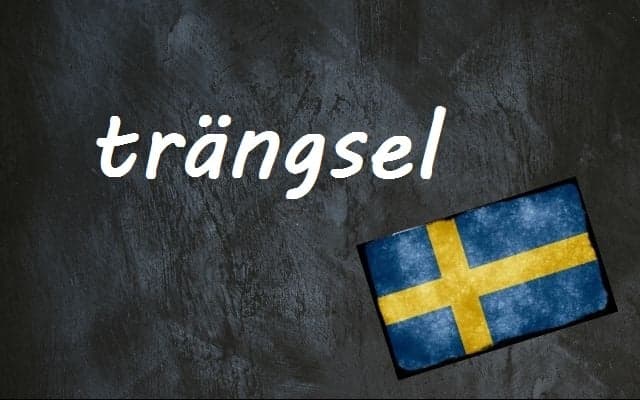Swedish word of the day: trängsel

Here's one of the Swedish words that's become a lot more heavily used during the coronavirus outbreak.
Trängsel means 'crowding' or 'congestion'; it describes a situation where there are a lot of people, vehicles, or things in one space.
It's implicit that you're talking about more people, vehicles or things than is desirable. You don't use it in a neutral way to say there were a lot of people somewhere, but to emphasise negative consequences of the crowding such as traffic moving more slowly, people being uncomfortable or getting hurt.
During the coronavirus outbreak, people have been warned to avoid trängsel, especially at usually crowded spots such as beaches and lidos, due to the risk of infection.
In normal times, you would only talk about trängsel at beaches if they were truly uncomfortably full, but now the threshold for a comfortable distance has changed during the pandemic, so it makes sense to refer to trängsel even when the actual numbers might be similar to previous years.
Previously, you might have come across this word in the compound noun trängselskatt or trängselavgift (congestion tax or congestion charge), fees which apply to motorists entering certain areas at busy times.
Trängsel has a related verb, tränga, which means 'to push'. And if you look into its roots, it's also related to trång (narrow) -- which itself is linked to the English word 'throng', meaning 'crowd'.
Examples
Varning för trängsel på vägarna under sommaren
Warning for congestion/traffic jams on the roads over summer
Undvik trängsel och håll avstånd
Avoid crowding and keep your distance
Comments
See Also
Trängsel means 'crowding' or 'congestion'; it describes a situation where there are a lot of people, vehicles, or things in one space.
It's implicit that you're talking about more people, vehicles or things than is desirable. You don't use it in a neutral way to say there were a lot of people somewhere, but to emphasise negative consequences of the crowding such as traffic moving more slowly, people being uncomfortable or getting hurt.
During the coronavirus outbreak, people have been warned to avoid trängsel, especially at usually crowded spots such as beaches and lidos, due to the risk of infection.
In normal times, you would only talk about trängsel at beaches if they were truly uncomfortably full, but now the threshold for a comfortable distance has changed during the pandemic, so it makes sense to refer to trängsel even when the actual numbers might be similar to previous years.
Previously, you might have come across this word in the compound noun trängselskatt or trängselavgift (congestion tax or congestion charge), fees which apply to motorists entering certain areas at busy times.
Trängsel has a related verb, tränga, which means 'to push'. And if you look into its roots, it's also related to trång (narrow) -- which itself is linked to the English word 'throng', meaning 'crowd'.
Examples
Varning för trängsel på vägarna under sommaren
Warning for congestion/traffic jams on the roads over summer
Undvik trängsel och håll avstånd
Avoid crowding and keep your distance
Join the conversation in our comments section below. Share your own views and experience and if you have a question or suggestion for our journalists then email us at [email protected].
Please keep comments civil, constructive and on topic – and make sure to read our terms of use before getting involved.
Please log in here to leave a comment.